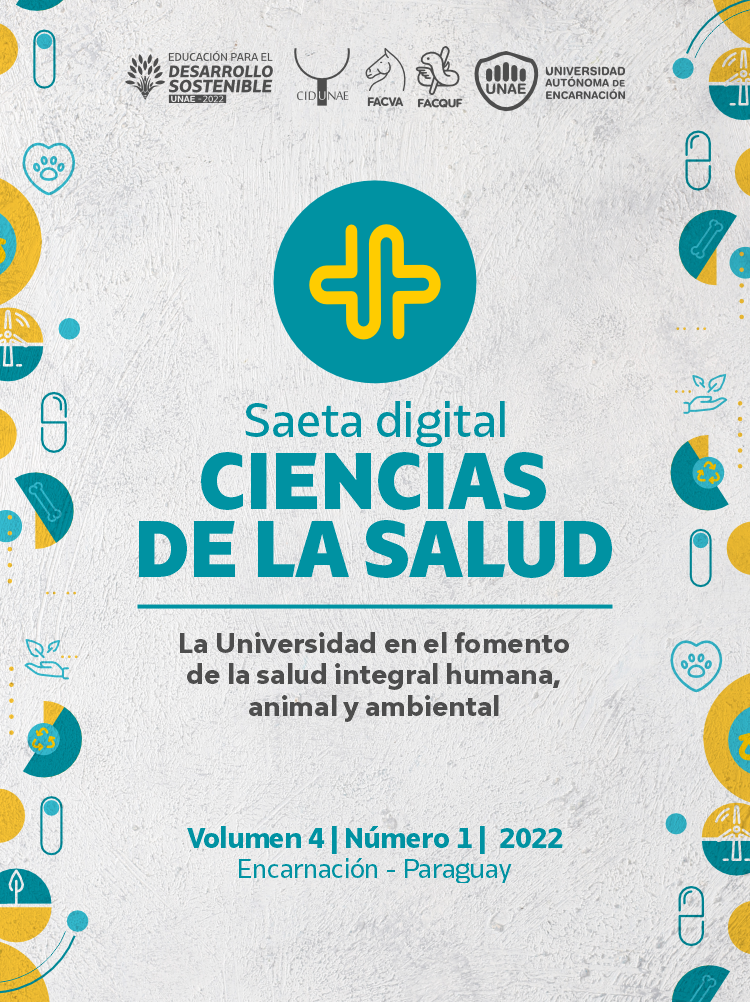AUTOMEDICACIÓN CON METILFENIDATO EN ESTUDIANTES DEL CURSO DE MEDICINA EN LA UNIVERSIDAD PRIVADA MARÍA SERRANA, FILIAL CDE EN EL AÑO 2022
Palabras clave:
Metilfenidato, Automedicación, Estudiantes de medicinaResumen
El presente trabajo describe la frecuencia del uso del metilfenidato entre los estudiantes de medicina de una universidad privada de Ciudad del Este, dado que esta práctica se ha expandido con fines distintos a los terapéuticos y va en aumento por parte de estudiantes y profesionales de la salud. Como uno de los Objetivos de Desarrollo Sostenible del Programa de las Naciones Unidas para el Desarrollo es la salud y bienestar, el presente estudio tuvo como objetivo determinar la frecuencia del uso del metilfenidato sin prescripción médica y los efectos positivos y/o adversos del mismo entre los estudiantes de medicina de la Universidad Privada María Serrana de CDE hasta el año 2022. Para ello, se realizó una encuesta con muestreo probabilístico estratificado por curso y sección, usando la plataforma Google Forms, alcanzando 102 participantes, siendo el mínimo 89, con un margen de error del 10% y un nivel de confianza de 95%. Un total de 40 personas (39,21%) manifestaron haber usado metilfenidato en algún momento de su vida; 30 (29,41%) dijeron que lo han hecho bajo prescripción médica. Entre los principales efectos adversos, podemos citar: náuseas (7,6%), insomnio (17,47%), disconfort (5,8%), taquicardia (17,47%), nerviosismo e irritabilidad (15,53%), cefaleas (17,47%), sequedad de boca (12,6%) y temblor de manos (8,7%). La frecuencia de uso del metilfenidato fue casi 2/5, siendo solo aproximadamente un 9% los que lo usan sin la correspondiente prescripción, según manifestaron los encuestados. Los principales motivos para el uso fueron mejorar la concentración y disminuir la fatiga física y mental. Entre los principales efectos adversos que manifestaron tener destacan el insomnio, la taquicardia, el nerviosismo e irritabilidad, las cefaleas y la sequedad de boca.
Citas
Siqueira-Gonçalves Cd, Leite-Ribeiro-Pedro RM. “Drogas da Inteligência?”: Cartografando as controvérsias do consumo da Ritalina para o aprimoramento cognitivo. Psicología, Conocimiento y Sociedad. 2019 Abril; 8(2).
do-Nascimento CS, Mota-de-Araújo KM, Gusmão DBMd, Moura-Souza P, dos-Santos-Júnior JA. Avaliação da automedicação entre estudantes de medicina de uma instituição de ensino de Alagoas. Rev Med (São Paulo). 2019 Diciembre; 98(6).
Barros D, Ortega F. Metilfenidato e Aprimoramento Cognitivo Farmacológico: representações sociais de universitários. Saúde Soc. São Paulo. 2011; 20(2).
Esher A, Coutinho T. Uso racional de medicamentos, farmaceuticalização e usos do metilfenidato. Ciência & Saúde Coletiva. 2017; 22(8).
Rodrigues CF, Lopes N, Hardon A. Beyond health: medicines, food supplements, energetics and the commodification of self-performance in Maputo. Sociology of Health & Illness. 2019; 41(6).
De-Souza-Coelho JV. Uso de psicoestimulantes por estudantes durante a vida acadêmica. 2018. Tesis de grado.
Tockus D, Gonçalves PS. Detecção do uso de drogas de abuso por estudantes de medicina de uma universidade privada. J Bras Psiquiatr.. 2008; 57(3).
Oliveira-Ramos R, Netto F, Almeida Jd, Franco-Netto R, da-Silva-Junior NZ, Mendes-da-Silva S, et al. Incidencia del uso no prescrito del Metilfenidato entre Estudiantes de Medicina. Rev. Inst. Med. Trop. 2018; 13(1).
Repantis D, Bovy L, Ohla K, Kühn S, Dresler M. Cognitive enhancement effects of stimulants: a randomized controlled trial testing methylphenidate, modafinil, and caffeine. Psychopharmacology. (2021; 238).
Publicado
Número
Sección
Licencia
Derechos de autor 2025 Ciencias de la Salud

Esta obra está bajo una licencia internacional Creative Commons Atribución 4.0.
Este obra está bajo una licencia de Creative Commons Reconocimiento 4.0 Internacional.
Los autores que publican en esta revista están de acuerdo con los siguientes términos:
- Los autores conservan los derechos de autor y garantizan a la revista el derecho de ser la primera publicación del trabajo al igual que licenciado bajo una Creative Commons Attribution License que permite a otros compartir el trabajo con un reconocimiento de la autoría del trabajo y la publicación inicial en esta revista.
- Los autores pueden establecer por separado acuerdos adicionales para la distribución no exclusiva de la versión de la obra publicada en la revista (por ejemplo, situarlo en un repositorio institucional o publicarlo en un libro), con un reconocimiento de su publicación inicial en esta revista.

